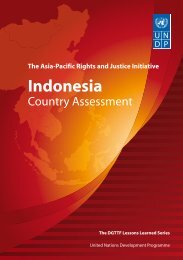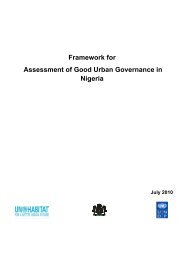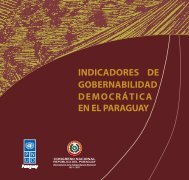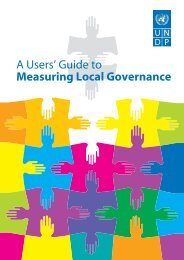English - UNDP
English - UNDP
English - UNDP
You also want an ePaper? Increase the reach of your titles
YUMPU automatically turns print PDFs into web optimized ePapers that Google loves.
Local Governance and Decentralization<br />
a number of functions that in a long run should become the<br />
responsibilities of district authorities and their departments (e.g.<br />
strategic development planning, decision making on resources<br />
allocation, updating, maintaining and analysing district socioeconomic<br />
database, coordination of development plans, and<br />
investments with external actors). The councils are currently<br />
supported through different projects and activities, which is<br />
why their sustainability remains critical.<br />
The sustainability of training programmes designed and tested<br />
with support of this project was ensured, because the Institute<br />
for Civil Service Training adopted them for its regular curricula.<br />
Training was delivered to district stakeholders in districts that<br />
have started to prepare development plans. However, capacities<br />
available at the district level are still weak, which affects the<br />
sustainability of the participatory planning concept. Despite<br />
intensive local capacity development efforts, the process of<br />
developing plans is being led to a large extent by national level<br />
experts, which is why further work on improving capacities at<br />
the district level is required.<br />
Improving the government’s information systems for planning,<br />
monitoring and evaluation of public policy helped to improve<br />
informed decision making and planning process. It also helped<br />
in monitoring and evaluating development inputs based on<br />
up-to-date and accurate data available at the district level. The<br />
introduction of multiple data collection and assessment tools<br />
required effort in terms of developing local partner capacities,<br />
but it currently operates well.<br />
The citizen report cards method became an attractive tool for<br />
monitoring changes based on citizens’ perception. The Centre<br />
for Strategic Research is leading and coordinating all activities<br />
related to collection of this information.<br />
Gender<br />
Gender indicators were not included at the project design stage,<br />
so gender mainstreaming was difficult to assess. The gender<br />
dimension within this project was, therefore, indirectly analysed,<br />
by reviewing activities, processes and analysing outputs.<br />
According to the training delivery reports, in all training sessions<br />
there were equal numbers of women and men. In addition, the<br />
project promoted gender balance in the district development<br />
councils. The data collected through the information system<br />
were disaggregated for men and women. This is the first required<br />
step in preparation of more gender sensitive policies.<br />
20






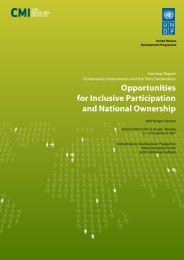
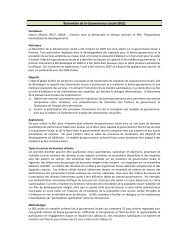
![GuÃa del Usuario ] - Governance Assessment Portal](https://img.yumpu.com/44740603/1/190x253/gua-a-del-usuario-governance-assessment-portal.jpg?quality=85)
